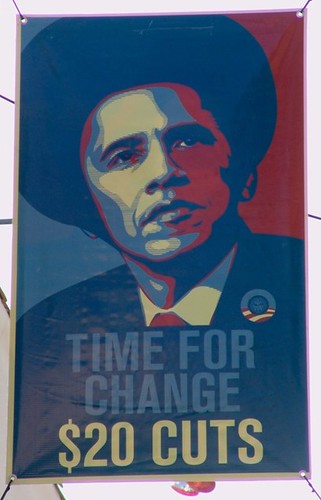It was as though the Champagne had been on ice for half a century or more. On Thursday night, with Barack Obama formally accepting the Democratic presidential nomination at Mile High Stadium in Denver, African-Americans from coast to coast and beyond felt they might now dare to pop the corks.
As I talked to black residents in and around Detroit, a troubled city that has never fully recovered from the riots of 1967, the personal stories — some of them pent-up for decades — came in an emotional rush, often accompanied by tears.
The message I heard again and again was that the triumph of Senator Obama in securing the nomination helped to redeem some of the disappointment and grief of many years of racial humiliation and oppression.
“I was in Clarksville, Miss., when Emmett Till passed away,” said Willie Banks, a sales representative who watched Senator Obama’s speech at Bert’s Warehouse Theatre, a cavernous restaurant and bar that had to set up tables and a portable video screen in the street to accommodate the overflow crowd.
Till, in one of the most notorious lynchings of the 20th century, was a 14-year-old black boy who was kidnapped, mutilated and murdered in Mississippi in 1955 for whistling or saying something fresh to a white woman. Photographs of his bloated, partially decomposed body circulated widely.
Mr. Banks was 12 at the time. “Those pictures really stuck in my mind,” he said. “And the message I got was if I stepped out of my place, that could happen to me. You shouldn’t have to think that way, but that’s the way I thought.
“So, no, I never thought I would see a black man nominated for president. This is such a great day.”
I mentioned to an elderly woman making her way into Bert’s that the weather had cleared up. A light rain had fallen earlier in the day.
She reacted with surprise, as if the comment had been foolish. “God wouldn’t let it rain on a moment like this,” she said.
Jennifer West, a 47-year-old insurance executive told me: “We’re all sitting on feelings we don’t usually talk about. We’re starved for a collective sense of affirmation. Barack is the son, the brother, the uncle, the cousin who made good. Who overcame. God bless him for what he means to us.”
The suddenness of Mr. Obama’s rise added to the sense of amazement.
“It’s so very exciting,” said Pearl Reynolds, who is 92 and whose elegant bearing and dress belied her hardscrabble origins in tiny Oak Ridge, La., where she worked as a child in the cotton fields.
“I got married at 14 only because I wanted to get out of there,” she said. “I had to. At 14, I was just being promoted from the second grade to the third grade because we could only go to school when we weren’t working in the fields.”
She became quite emotional during Senator Obama’s speech. “Barack Obama is a measure of how far we’ve come as a country since I was a little girl,” she said.
P.T. Cochran would agree. Mr. Cochran, 88, a retired appraiser for the city of Detroit, recalled a day in 1944 when he and a fellow student at Wilberforce University, a black school in Ohio, went into the town of Xenia to see a movie. The ticket taker told them the theater was closed.
“We knew it wasn’t closed,” said Mr. Cochran. “They just didn’t want to let us in. So we stood there, watching to see if they would let anyone else in.”
The ticket taker refused to admit anyone as long as the two friends were standing outside. They stood there for six hours. Then they called the school and let other friends know what they were doing. The students at Wilberforce alerted white students at nearby Antioch College.
Students from both schools turned out in force — more than 100 of them — to support Mr. Cochran and his friend. “They all stood there with us, to back us up,” said Mr. Cochran. At that point, his voice broke, and he wept softly at the memory from 64 years ago.
“We stayed there until the theater closed that night,” said Mr. Cochran. “And then we came back the next day, which was Sunday, and stood there until 2 or 3 in the afternoon, when they finally decided to let us in.
“I’ll never forget what those kids did for us.”
Mr. Cochran said it would take an hour, “maybe more,” to describe how much Senator Obama’s candidacy meant to him. “I am elated,” he said. “I’m surprised, I—”
His voice broke once again. His tears, and those of so many others, were a measure of the enormity of what had come to pass.






